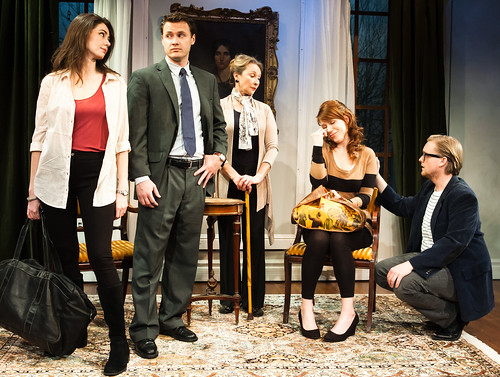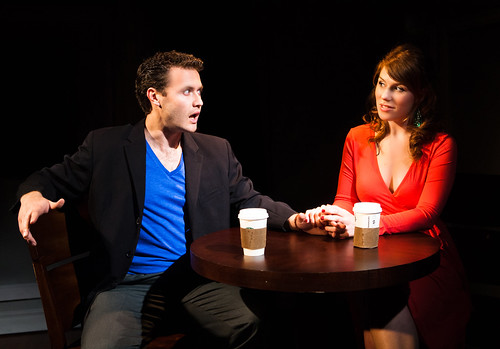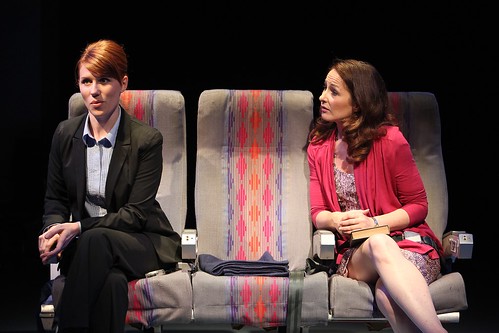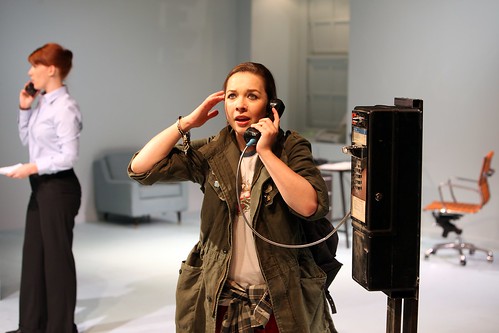
Lauren English as Gillian Holroyd casts a spell on publisher Shep Henderson, played by William Connell, in the San Francisco Playhouse production of Bell, Book and Candle, a 1950 romantic comedy by John Van Druten. Below: English (center) confers with Zehra Berkman (left) as Queenie and Scott Cox as Nicky. Photos by Jessica Palopoli
Oh, how I would love to tell you how a graceful and convincing performance by Lauren English and a sturdy production by Bill English rescues John Van Druten’s 1950 comedy Bell, Book and Candle from the heap of mediocre mid-century plays that have become irretrievably dated. And while Team English is indeed in good form here, the play itself is an attempt at enchantment that fails to enchant.
It very well could be that this play has been forever ruined for me by the TV show “Bewitched,” which for eight seasons never failed to delight me as a witch made a family with a mortal man in a world with a closed collective mind where issues of magic were concerned. The TV show, which was inspired by Van Druten’s play as well as the 1942 movie I Married a Witch, featured a blithe central performance by the ever-enchanting Elizabeth Montgomery, who somehow seemed above all the slapstick mayhem surrounding her. Members of the magic world were played for big laughs, none more so that Agnes Moorehead’s delicious Endora, the mother-in-law from character actress hell (or heaven, depending on your point of view).
Van Druten’s play has none of the TV show’s charm and ends up a two-hour sitcom without many laughs. His primary witch, Gillian Holroyd, is bored and is ready for something more in her life, something witchcraft can’t offer. When she meets one of her Manhattan apartment building neighbors, a handsome publisher named Shepherd Henderson, she isn’t allowed to simply fall for him. Rather, Van Druten makes her spark to jealousy because Shep is engaged to one of her old college nemeses. And he deosn’t let her simply beguile the mortal with her feminine charms without casting a spell on the poor guy.
So this amounts to one of the quickest and least interesting courtships imaginable. All this renders Gillian not terribly likable, so when she decides to come clean about her sorcery, the dramatic stakes aren’t very high, and the notion of Gillian and Shep ending up together isn’t terribly compelling.
Van Druten could at least surround his witch with interesting characters the way Montgomery’s Samantha on “Bewtiched” was up to her pretty eyeballs in spell-casting goofballs. But no, the relative down the hall, Queenie, is sort of a bumbler and meddler. And brother Nicky, a warlock, doesn’t have much of a profile beyond his sex life, which is mentioned several times. An author who has written a popular book about magic is thrown into the mix, but he doesn’t end up with much to do.
Director Bill English tries to mine this shallow material for something meaty — like early attempts at feminism, letting women wield the power, allowing shadow cultures to emerge from secrecy and shame — but there’s not enough there to sustain the play. At least English, in his role as set designer, delivers a sleek and stunning New York apartment with a gorgeous view of the Chrylser Building.
Lauren English’s performance as Gillian is admirable because the actress is so deft at combining the smooth polish of romantic comedy with some real emotion and complication. But again, Van Druten’s writing only allows a textured approach to go so far, so the talented and lovely English is caught up short.
Supporting actors Zehra Berkman as Queenie, Scott Cox as Nicky and Louis Parnell as the author, do their best to give this soggy material some effervescence. Leading man William Connell as Shep comes awfully close to being a perfect 1950s leading man, but the play never really lets Shep emerge as a worthy subject of Gillian’s affection. If she’s willing to give up being a witch for this guy, we never really get to see why. And we certainly can’t discern any plausible future for these two.
The whole notion of magic among mortals is so delicious, so fun — everything Van Druten’s play is not. This San Francisco Playhouse production tries to keep it light without letting it be silly, but the play itself combined with a typically 1950s ending that makes you crave Endora’s interference, keeps things pretty bland.
[bonus interview]
I interviewed Lauren English for a feature in the San Francisco Chronicle. Read the story here.
FOR MORE INFORMATION
John Van Druten’s Bell, Book and Candle continues through Jan. 19 at San Francisco Playhouse, 450 Post St., San Francisco. Tickets are $30-$70. Call 415-677-9596 or visit www.sfplayhouse.org.





